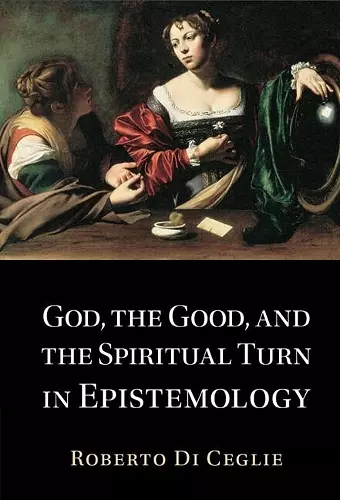God, the Good, and the Spiritual Turn in Epistemology
Format:Hardback
Publisher:Cambridge University Press
Published:18th Aug '22
Currently unavailable, and unfortunately no date known when it will be back

An investigation showing that commitments to God and/or the good generate the best possible condition to achieve knowledge.
Champions a spiritual turn in epistemology. If believers and unbelievers commit themselves to God and the good, respectively, they generate the best possible condition to successfully conduct rational enquiries and discussions. Although this has happened in practice throughout history, this book provides the first formulation of the theory.In this book, Roberto Di Ceglie offers an historical, theological, and epistemological investigation exploring how commitments to God and/or the good generate the optimum condition to achieve knowledge. Di Ceglie criticizes the common belief that to attain knowledge, one must always be ready to replace one's convictions with beliefs that appear to be proven. He defends a more comprehensive view, historically exemplified by outstanding Christian thinkers, whereby believers are expected to commit themselves to God and to related beliefs no matter how convincing the evidence contradicting such beliefs appears to be. He also argues that both believers and unbelievers can commit themselves to God and the good, respectively, thereby creating a spiritual turn in epistemology that enables them to generate the best possible condition for conducting rational enquiries and discussion.
'In this fine study, Professor Di Ceglie offers a robust defence of a position that challenges some key modernist assumptions. His central claim is that our moral and spiritual commitments should dispose us to maintain the core beliefs that sustain these, even when faced by apparently strong counter-evidence. By applying insights from Aquinas to contemporary debates, he has provided us with an informed and measured treatment of the subject.' David Fergusson, Regius Professor of Divinity, University of Cambridge
'In this innovative study of our deepest hunches, Di Ceglie cuts through a great deal of epistemological complexity. He makes a case for the 'Spiritual Turn' towards human flourishing and the good over a commitment to evidence-based reasoning. This is fresh and original: Di Ceglie is surely on to something important here.' Mark Harris, Professor of Natural Science and Theology, University of Edinburgh
'An historically rich and novel treatment of important epistemological questions related to the nature of religious and moral conviction.' Duncan Pritchard, UC Distinguished Professor of Philosophy, University of California, Irvine, USA
'Roberto Di Ceglie's book shows that it is from commitment to God and the good that we expect the beneficial orientation of our intellectual life, and not from our initiative of doxastic control in mere epistemology. Modern and contemporary epistemology has been conceived primarily in terms of justification and evidence. The spiritual turn proposed by Di Ceglie is anchored in the thought of Saint Thomas: our religious commitments are so intellectually vital that they are constitutive of our rationality. 'Apart from me you can do nothing' (John 15: 5): this is true also about our intellectual life!' Roger Pouivet, Professor of Philosophy at Université de Lorraine, France
'Roberto Di Ceglie's book shows that it is from commitment to God and the good that we expect the beneficial orientation of our intellectual life, whereas modern and contemporary epistemology has been conceived primarily in terms of justification and evidence. The spiritual turn proposed by Di Ceglie is anchored in the thought of Saint Thomas: our religious and moral commitments are so intellectually vital that they are constitutive of our rationality.' Roger Pouivet, Professor of Philosophy at Université de Lorraine
'Di Ceglie's creative intellectual argument effectively demonstrates that 'commitment' needs to be part of the intellectual project for a more 'comprehensive' account of knowledge. It also successfully raises valuable questions about the privileging of certain forms of knowledge in the debate about faith and reason.' Jeremy Carrette, The Expository Times
ISBN: 9781009203555
Dimensions: 235mm x 158mm x 20mm
Weight: 520g
350 pages